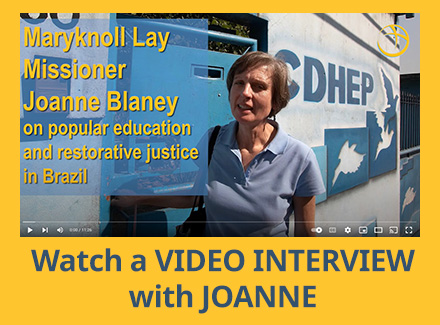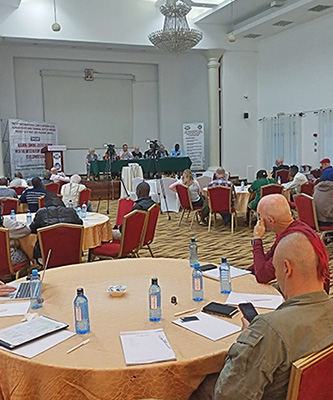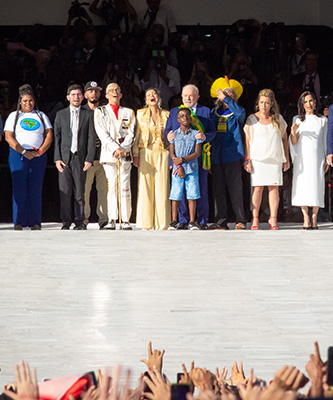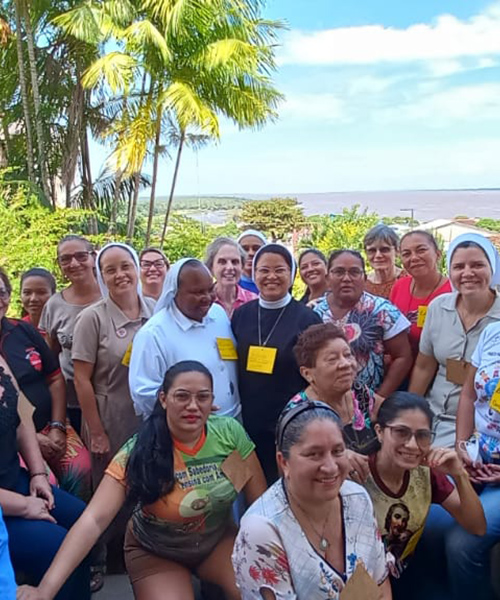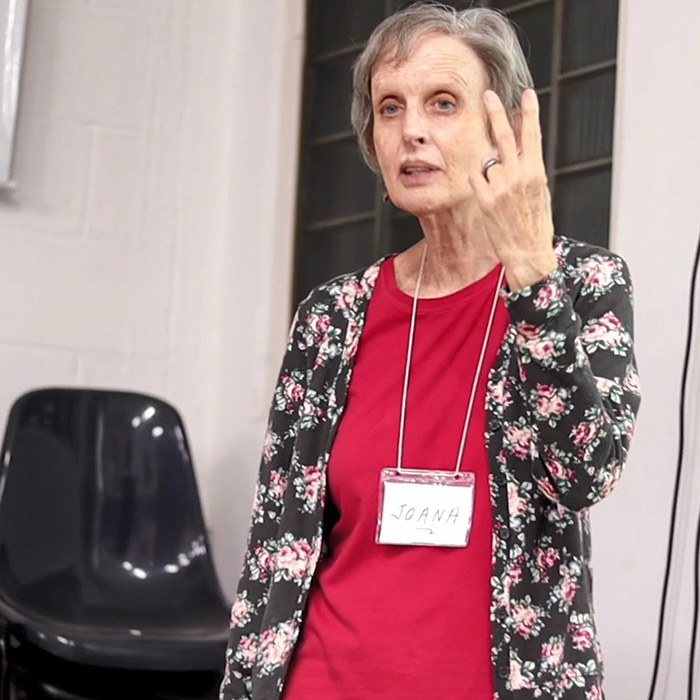
Joanne Blaney
Year Joined MKLM: 1991
Country: Brazil
City: São Paulo
Ministry: Human Rights and Popular Education Center – Restorative justice, forgiveness and reconciliation
Ministry Area: Education and Leadership Training, Justice and Peace
Goals of Ministry: Work with people and groups to prevent and intervene in conflictual situations through restorative circles and build capacity in restorative justice practices, forgiveness and reconciliation. Train multipliers in community restorative justice practices to resolve conflicts on the local level and prevent mass incarceration.
Nonviolence Focus:
Prevention, Intervention and Reconciliation/Restoration. Joanne’s ministry at the Human Rights and Popular Education Center (CDHEP) serves marginalized and vulnerable populations who suffer various types of exclusion and violence. Through accompaniment of individuals and groups, workshops, courses and restorative mediation circles, she works to prevent violence, intervene in conflicts and to bring about restoration of those involved.
Ministry Context:
According to statistics from the Brazilian Institute of Geography and Statistics (IBGE) and the World Bank, Brazil has 13.5 million people living in extreme poverty, and 25% of the population in poverty. The Brazilian Catholic bishops’ Lenten Campaign in 2023 addresses the situation of hunger in the country and speaks out against policies that they say disproportionately hurt the poor. All of this contributes to the violence in the country.
Brazil is 60% Catholic and there has been an increase in fundamentalist groups over the years, which, along with some politicians, have contributed to polarization and intolerance.
Brazil ranks a dismal 87th on the 2022 United Nations Human Development Index. This social and economic inequality is one of the causes for violence, as is racism and gender violence. Brazil is the third highest country in the world for the percentage of its population in prison. Access to guns, deplorable conditions in most of the prisons and lack of rehabilitation for those with addictions contribute to insecurity in the city.
In the city of São Paulo, 33,000 people are homeless and live on the streets. Almost 70% of the city’s population live in very precarious or clandestine housing where conflicts are common. These favelas, without minimum infrastructure, also suffer from flooding each year, which causes loss of homes and lives and intense degradation of the environment. This is part of the neighborhood where the Human Rights and Popular Education Center is located. It is one of the most violent in the city and the most common types of conflicts are urban, domestic and drug related. This area lacks decent schools, health services and recreational areas.
There is a general lack of trust in the formal justice system. Our work with nonviolence and restorative justice provides spaces for people to heal from these traumas, to come together and to dialogue about differences and resolve conflicts without violence. We also form multipliers who then work in their communities, churches and organizations on the themes of nonviolence, forgiveness and reconciliation.
Current Ministry:
Joanne works with restorative justice practices, with a focus on nonviolence, working to prevent violence and intervening in violent situations. Her ministry at the Popular Education and Human Rights Center (CDHEP) in São Paulo serves marginalized and vulnerable populations and focuses on Gospel values of compassion, forgiveness and a just justice for all.
Joanne trains members of the community, church, judicial system and other groups in violence prevention, nonviolent communication and restorative justice practices. She facilitates conflict-mediation circles for families and those in conflict, working to restore people and relationships. She works with women in prison and accompanies victims of crimes. She values working with a team of Brazilians, and, in her words, “I have been inspired by the hope and actions of Brazilians, who continue to struggle with ever-increasing violence and injustice. We work in direct service and participate in local, national and international organizations to change unjust structures that contribute to poverty and violence.”
Joanne and her teammates travel throughout Brazil to teach courses on conflict mediation, forgiveness, nonviolent communication, reconciliation and restorative practices. She is currently working with women church leaders in the Amazon area. The courses and workshops use Paulo Freire’s popular-education, holistic model and have ongoing supervision so that participants become course multipliers.
Personal Data:
Joanne is originally from Philadelphia and worked as a junior-high school teacher and school principal in Philadelphia and Washington, D.C. She has a master of arts degree in education and is a certified mediator of conflicts as well as facilitator and trainer of trainers of restorative justice practices. Joanne has experience in working with RCIA programs, parish councils, literacy programs and domestic violence issues. She was the co-director of Franciscan Mission Service in Washington, DC. In Brazil, Joanne began her ministry with a grassroots shantytown housing organization whose goals were to form base communities, organize collectively and build brick houses for those living in very precarious situations. Joanne is a founding member of Associação Fala Mulher, an organization that works to heal women and children, who are victims of domestic violence.
Joanne was also the director of Maryknoll Lay Missioners’ Mission Services Department for three years and oversaw the planning, implementation and evaluation of the department’s programs.
She continues to be involved domestically and internationally with restorative justice conferences and programs. She has given presentations at restorative justice conferences in Australia, Brazil, Northern Ireland and the United States. In 2018 she gave presentations and courses in Finland, Kenya and Rwanda. She presented her work entitled “ESPERE – Schools of Forgiveness and Peacemaking” at the International Congress of World Religions in Australia. Joanne also co-authored a Forgiveness, Reconciliation and Restorative Justice book that is being used with adolescents and children in São Paulo social-educational centers.
Her work with a team at the CDHEP center in training judicial workers in courthouses in Brazilian states resulted in a publication entitled “Rede Justiça Restaurativa: Possibilidades e Práticas nos sistemas criminal e socioeducativo.” (Restorative Justice Network: Possibilities and Practices in the Criminal Justice System with Adults and Juveniles). This project was a partnership between CDHEP, the United Nations Program for Development, the National Department of Penitentiaries, and the National Council of Justice in Brazil.

